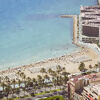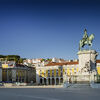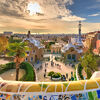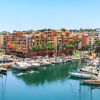10 Nights | IBERIAN ICONS
You will visit the following 11 places:

Palma
Palma is a resort city, the capital and largest city of the autonomous community of the Balearic Islands in Spain. It is situated on the south coast of Majorca on the Bay of Palma. As of the 2009 census, the population of the city of Palma proper was 401,270, and the population of the entire urban area was 621,000, making it the twelfth largest urban area of Spain. Almost half of the total population of Majorca live in Palma. The Cabrera Archipelago, though widely separated from Palma proper, is administratively considered part of the municipality. Its airport, Son Sant Joan, serves over 22 million passengers each year.

Alicante
Alicante is a port city on Spain’s southeastern Costa Blanca, and the capital of the Alicante province. The area around Alicante has been inhabited for over 7000 years. The first tribes of hunter gatherers moved down gradually from Central Europe between 5000 and 3000 BC. Some of the earliest settlements were made on the slopes of Mount Benacantil. By 1000 BC Greek and Phoenician traders had begun to visit the eastern coast of Spain, establishing small trading ports and introducing the native Iberian tribes to the alphabet, iron and the pottery wheel. By the 3rd century BC, the rival armies of Carthage and Rome began to invade and fight for control of the Iberian Peninsula. The Carthaginian general Hamilcar Barcaestablished the fortified settlement of Akra Leuka (meaning "White Mountain" or "White Point"), where Alicante stands today. The city is popular for its stunning beach views, nightlife, hotel resorts and festivals.

Lisbon
The capital of Portugal, Lisbon (Portuguese: Lisboa) has experienced a renaissance in recent years, with a contemporary culture that is alive and thriving and making its mark in today's Europe. Perched on the edge of the Atlantic Ocean, Lisbon is one of the rare Western European cities that faces the ocean and uses water as an element that defines the city. Lisbon enchants travellers with its white-bleached limestone buildings, intimate alleyways, and an easy-going charm that makes it a popular year-round destination.

Málaga
Málaga is a large city in the southern Spanish region of Andalucia and capital of the Malaga Province. The largest city on the Costa del Sol, Malaga has a typical Mediterranean climate and is also known as the birthplace of famous Spanish artist Pablo Picasso. The city offers beaches, hiking, architectural sites, art museums, excellent shopping and cuisine. While more laid back than Madrid or Barcelona, Malaga is still the center and transport hub for the hugely popular Costa del Sol region, which is flooded with tourists in the summer, and the city has certainly cashed in on the sun and sand, with lots of new construction as well as hotels and facilities geared to tourists. However, Malaga also offers some genuinely interesting historical and cultural attractions in its old city and its setting on the coast is still beautiful.

Marseille
Marseille, known in antiquity as Massalia, is the second largest city in France, after Paris, with a population of 852,395 within its administrative limits on a land area of 240.62 km2. The urban area of Marseille extends beyond the city limits with a population of over 1,420,000 on an area of 1,204 km2. 1,530,000 or 1,601,095 people live in the Marseille metropolitan area. Located on the southeast coast of France on the Mediterranean Sea, Marseille is France's largest commercial port and largest French city on the Mediterranean coast. Marseille is the capital of the Provence-Alpes-Côte d'Azur region, as well as the capital of the Bouches-du-Rhône department. Its inhabitants are called Marseillais.

Barcelona
Barcelona – Spain's enchanting capital, second largest and most populous city. It is a huge city that vibrates with life, and there’s certainly not another city in the country to touch it for its sheer style, looks or energy. It is one of the world's leading tourist, economic, trade fair and cultural centers, and its influence in commerce, education, entertainment, media, fashion, science, and the arts all contribute to its status as one of the world's major global cities. Barcelona is home to masterpieces of many great architects – the most famous of which is Antoni Gaudí.

Valencia
Valencia is the most populous city of the Autonomous Community of Valencia and the third largest city in Spain, with a population of 809,267 in 2010. It is the 15th-most populous municipality in the European Union. It is integrated into an industrial area on the Costa del Azahar. Its historic centre is one of the largest in Spain, with approximately 169 hectares; this heritage of ancient monuments, views and cultural attractions makes Valencia one of the country's most popular tourist destinations!

Monte Carlo
Monte Carlo, officially refers to an administrative area of the Principality of Monaco, specifically the ward of Monte Carlo/Spélugues, where the Monte Carlo Casino is located. Monaco has four traditional quarters - from west to east they are: Fontvieille (the newest), Monaco-Ville (the oldest), La Condamine, and Monte Carlo. Monte Carlo (literally "Mount Charles") is situated on a prominent escarpment at the base of the Maritime Alps along the French Riviera. Near the western end of the quarter is the world-famous Place du Casino, the gambling center which has made Monte Carlo "an international byword for the extravagant display and reckless dispersal of wealth". It is also the location of the Hôtel de Paris, the Café de Paris, and the Salle Garnier (the casino theatre which is the home of the Opéra de Monte-Carlo).

Cadiz

Sete
Sète is a major port in the southeast French region of Languedoc-Roussillon. Known as the Venice of Languedoc and the singular island (in Paul Valéry's words), it is a port and a seaside resort on the Mediterranean with its own very strong cultural identity, traditions, cuisine and dialect. It is also the hometown of artists like Paul Valéry, Jean Vilar, Georges Brassens, Gregory Del Piero, Hervé Di Rosa, Manitas de Plata, and Robert Combas.










